Thousands of retired and active civil servants, public-school teachers and military personnel took to the streets in Taipei yesterday, demanding that the government abstain from targeting them in planned pension reforms.
In the first massive demonstration since President Tsai Ing-wen (蔡英文) took office in May, protesters spilled from Ketagalan Boulevard onto Zhongshan S Road and several other roads blocks away, with the Taipei Police Department estimating that about 117,000 attended, while organizers claimed there were more than 250,000 participants.
The size of the crowd was swelled by an official mobilization by the Chinese Nationalist Party (KMT), with KMT Chairwoman Hung Hsiu-chu (洪秀柱) pledging to “stand with” the protesters.
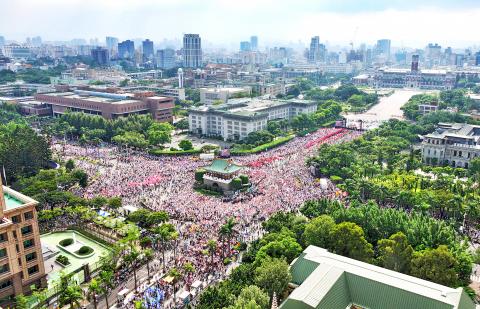
Photo: Lo Pei-der, Taipei Times
While Hung did not take to the stage, she greeted the leaders of one line of former military personnel with flowers and flags, with participants having photographs taken with her.
The KMT also set up several “gas stations” — a play on the Mandarin phrase “add oil,” an expression of encouragement — along march routes, handing out water and Republic of China (ROC) flags.
“Reform absolutely should not be carried out by putting labels on people or pitting generations against each other,” she said, adding that her party had pushed for pension reforms under former president Ma Ying-jeou (馬英九) while the DPP had stalled the efforts in the legislature.
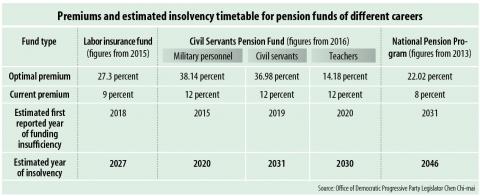
Former premier Hau Pei-tsun (郝柏村) marched in his capacity as a former army general, while several KMT legislators and city councilors also took part.
The demonstration began yesterday afternoon with retired military personnel gathering outside Daan Forest Park (大安森林公園) and National Chiang Kai-shek Memorial Hall before marching to the rally site on Ketagalan Boulevard in front of the Presidential Office Building, walking in formation, waving large ROC flags and singing military anthems.
Retired civil servants, police officers and firefighters gathered at the 228 Peace Memorial Park before walking to Ketagalan Boulevard, while retired public-school teachers converged at National Chiang Kai-shek Memorial Hall’s Liberty Square.
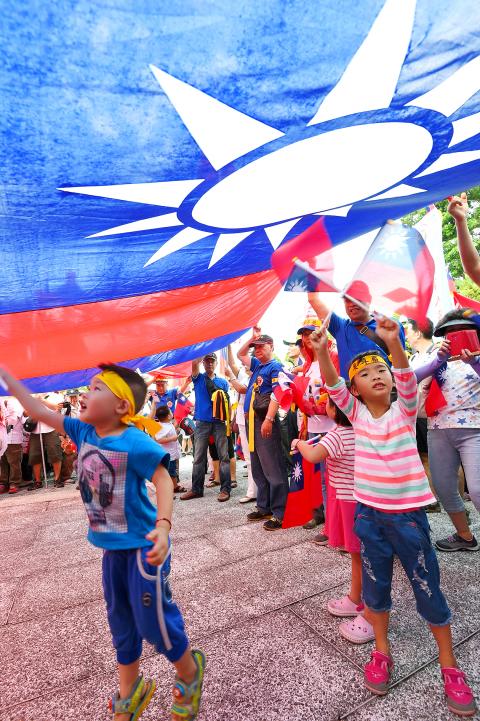
Photo: Chang Chia-ming, Taipei Times
Protesters shouted slogans opposing “stigmatization” and demanding “dignity,” with the Alliance for Monitoring Pension Reform — which organized the march — calling for fiscal reforms and fund management improvements to offset some of the need for cuts, while also demanding that any changes to benefits and contribution formulas not be applied retroactively.
Tsai has asked the Presidential Office’s National Pension Reform Committee to draft a consensus pension reform plan, with Minister Without Portfolio Lin Wan-i (林萬億), the deputy convener and executive director of the committee, pledging to resign if a plan is not drafted and submitted to the Legislative Yuan by May next year.
Some protesters expressed distrust of Tsai’s push for reforms.
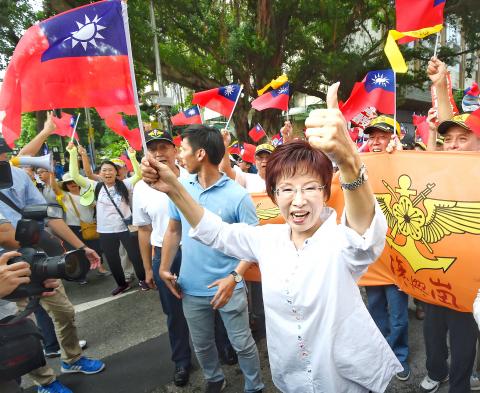
Photo: Fang Pin-chao, Taipei Times
“We are afraid of pension reform, because the Democratic Progressive Party (DPP) is now in full control,” said a woman surnamed Chan (詹), who said she is a former civil servant living in Taichung. “Without the KMT’s participation, there is no way to know what the final plan will look like beforehand. Waiting until a plan is announced would be too late. We have to step forward now before anything is finalized.”
Chan said that the government’s focus on discussions over relative “replacement ratios” between salaries and pensions for public and private-sector employees was unreasonable because of the different nature of the systems.
“We had to go through testing before being hired and that door is always open,” she said. “So if you think we have better treatment, you can always take the test yourself.”
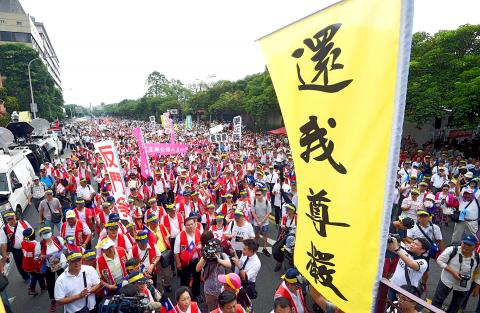
Photo: Lo Pei-der, Taipei Times
“We feel that fiscal reform should be comprehensive and not just targeted at us,” said Kuo Wen-ching (郭文進), a retired soldier, who called for the government to raise taxes on corporations instead of trying to “hunt down” former government employees.
He also rejected remarks by Tsai on Friday that former military personnel had “special circumstances” that warranted their being treated differently as part of pension reform, accusing her of trying to divide former government employees while remaining “coy” about the nature of cuts.
According to the committee, there are 13 pension programs in effect in Taiwan.
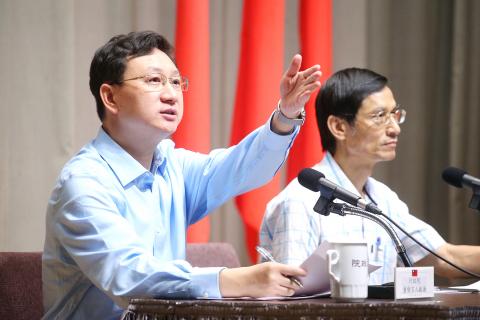
Photo: CNA
The average monthly pension is NT$49,379 for military personnel, NT$56,383 for civil servants, NT$68,025 for public-school teachers, NT$17,223 for private-school teachers, NT$16,179 for employees covered by labor insurance, NT$7,256 for farmers and NT$3,628 for workers covered by general public insurance, it said.
Low contributions coupled with the nation’s aging population have put most of the funds on course for bankruptcy within two decades, with Minister of Civil Service Chou Hung-hsien (周弘憲) last week saying that pension contributions by civil servants, military personnel and teachers would have to be tripled for the funds to be sustainable over the next 50 years at current payment levels.
At a news conference at the Executive Yuan later yesterday, Lin said the committee would convene pension reforms meetings next month and in November across the nation before a national conference in January or February next year.
Additional reporting by CNA

SECURITY: As China is ‘reshaping’ Hong Kong’s population, Taiwan must raise the eligibility threshold for applications from Hong Kongers, Chiu Chui-cheng said When Hong Kong and Macau citizens apply for residency in Taiwan, it would be under a new category that includes a “national security observation period,” Mainland Affairs Council (MAC) Minister Chiu Chui-cheng (邱垂正) said yesterday. President William Lai (賴清德) on March 13 announced 17 strategies to counter China’s aggression toward Taiwan, including incorporating national security considerations into the review process for residency applications from Hong Kong and Macau citizens. The situation in Hong Kong is constantly changing, Chiu said to media yesterday on the sidelines of the Taipei Technology Run hosted by the Taipei Neihu Technology Park Development Association. With

CARROT AND STICK: While unrelenting in its military threats, China attracted nearly 40,000 Taiwanese to over 400 business events last year Nearly 40,000 Taiwanese last year joined industry events in China, such as conferences and trade fairs, supported by the Chinese government, a study showed yesterday, as Beijing ramps up a charm offensive toward Taipei alongside military pressure. China has long taken a carrot-and-stick approach to Taiwan, threatening it with the prospect of military action while reaching out to those it believes are amenable to Beijing’s point of view. Taiwanese security officials are wary of what they see as Beijing’s influence campaigns to sway public opinion after Taipei and Beijing gradually resumed travel links halted by the COVID-19 pandemic, but the scale of

A US Marine Corps regiment equipped with Naval Strike Missiles (NSM) is set to participate in the upcoming Balikatan 25 exercise in the Luzon Strait, marking the system’s first-ever deployment in the Philippines. US and Philippine officials have separately confirmed that the Navy Marine Expeditionary Ship Interdiction System (NMESIS) — the mobile launch platform for the Naval Strike Missile — would take part in the joint exercise. The missiles are being deployed to “a strategic first island chain chokepoint” in the waters between Taiwan proper and the Philippines, US-based Naval News reported. “The Luzon Strait and Bashi Channel represent a critical access

Pope Francis is be laid to rest on Saturday after lying in state for three days in St Peter’s Basilica, where the faithful are expected to flock to pay their respects to history’s first Latin American pontiff. The cardinals met yesterday in the Vatican’s synod hall to chart the next steps before a conclave begins to choose Francis’ successor, as condolences poured in from around the world. According to current norms, the conclave must begin between May 5 and 10. The cardinals set the funeral for Saturday at 10am in St Peter’s Square, to be celebrated by the dean of the College